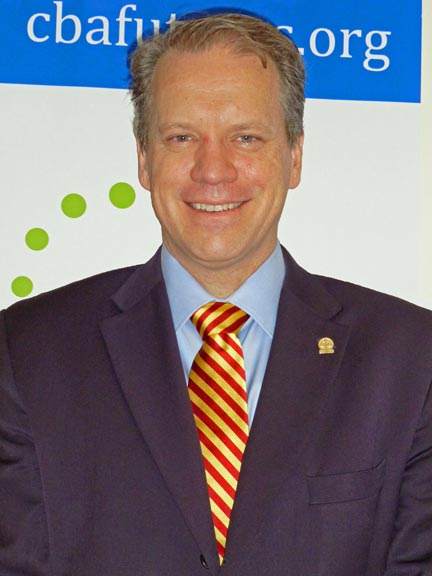
A year after its release, the most controversial element of the Canadian Bar Association’s report, "Transforming the Delivery of Legal Services in Canada," remains its recommendation to allow alternative business structures, says the initiative’s chair.
 “That is a recommendation that certainly attracted a lot of attention, a lot of good discussion. We’ve certainly heard a number of different voices come forward with a number of different perspectives on it,” says Fred Headon.
“That is a recommendation that certainly attracted a lot of attention, a lot of good discussion. We’ve certainly heard a number of different voices come forward with a number of different perspectives on it,” says Fred Headon.
“It’s a question that I think we’re going to continue to grapple with in the coming weeks and months . . . there’s not a unanimous view out there in the profession.”
The report calls for allowing “non-lawyer investment in legal practices,” albeit on a carefully regulated basis, and for allowing businesses or not-for-profit corporations to register as ABSs providing legal services.
The recommendation has attracted considerable resistance, especially from personal injury firms. It became one of the most contentious issues in the Law Society of Upper Canada’s bencher elections this spring. Most of those voted in as benchers oppose the idea.
But Headon says he thinks the debate around ABSs will continue — and ought to.
“I think if we were to forego ABS as we sit here today, that would be an unfortunate development, at least as we see the equation today, because the rationale for our recommendation, of course, was that we thought that would be a helpful way to encourage innovation and help the profession adapt to change,” he says.
“If this were not to come to light it may be more difficult for the profession to integrate that kind of knowledge and expertise and skill into what we do.”
In a Globe and Mail article this week, Australian personal injury giant Slater & Gordon Ltd. — a publicly traded corporation — confirmed it is looking at expanding into Canada if regulations here change to allow it. According to the article, Slater & Gordon already serves an estimated one-quarter of Australia’s personal injury market.
The Canadian legal profession, Headon says, could learn a lot about innovation from looking at Slater & Gordon.
“They certainly have been a bit of a trailblazer, in a number of different ways in providing alternative career paths — it’s led to one of the most diverse firms in the marketplace,” says Headon.
“Certainly I think whatever their accounting troubles, we can look to what else they’ve done as a bit of an example to consider as to what opportunities are out there.”
Slater & Gordon, the article reports, is facing an investigation into its accounting practices after its acquisition last year of part of a British insurance claims processing company.
For now, the report’s recommendation on ABSs has the backing of the CBA’s Futures Initiative — but is not the official policy CBA as it has not yet been put to a vote before the association’s council. Nor is a vote likely to happen at next week’s annual meeting in Calgary, says Headon.
“It’s not on the agenda this time — we have a pretty heavy agenda already — and so we will continue to dialogue within CBA,” he says.
“We’ve talked about the hows and whens, but certainly had no particular timeline [for a vote]. . . . We’re comfortable that the work of the initiative is on track, is getting a good reception, and if and when resolutions are the way to go we certainly won’t be shy to bring them to council.”